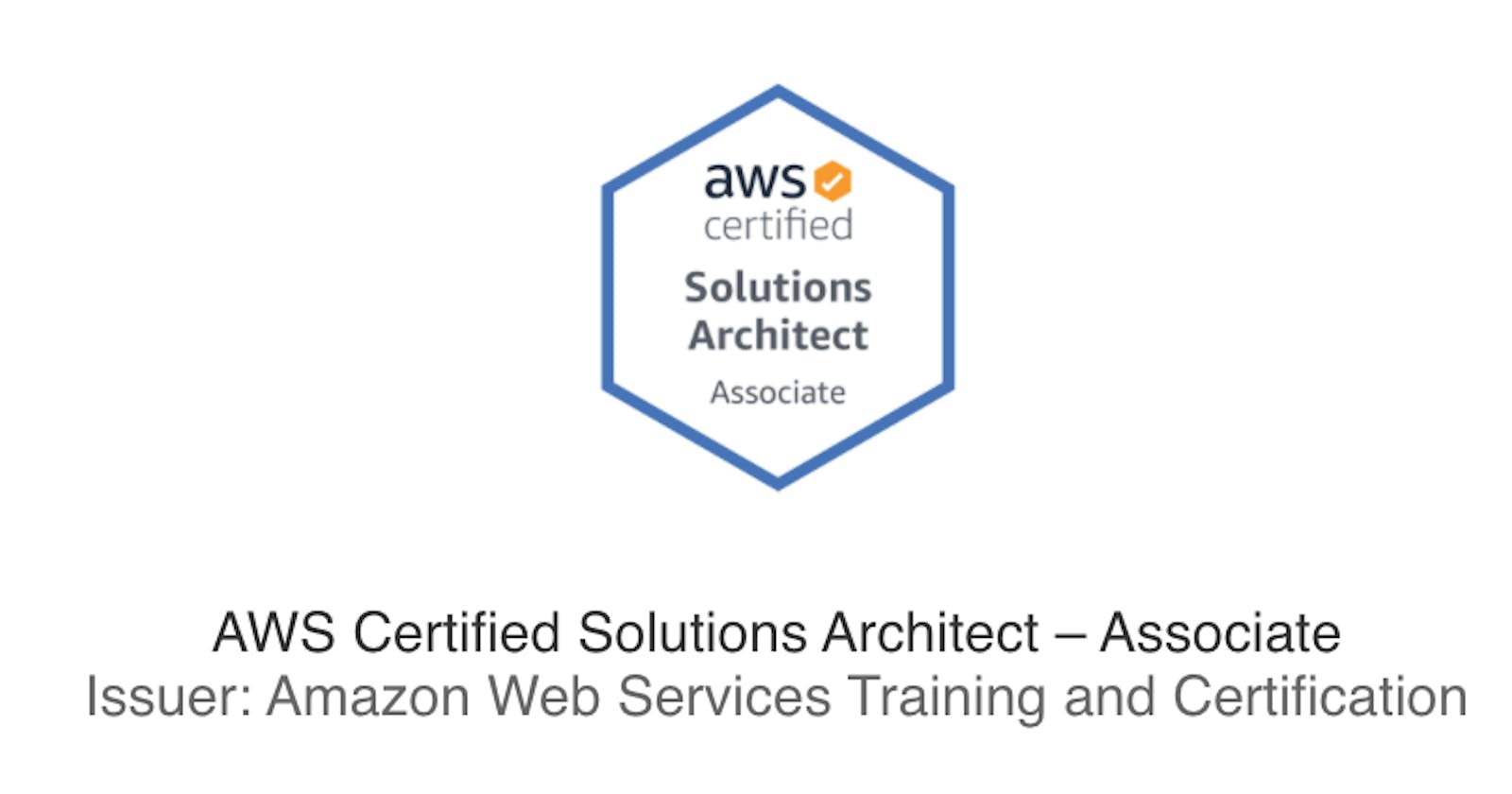Preparation for AWS Solutions Architect - Associate Certificate Examination 2020
I've just passed the examination and got a certificate for it. It was quite a shock because the questions are quite different from what I had done in the AWS Sample Question found in AWS official documentation and the 2 sets of practical questions in Udemy Course. However, I would like to share my 2 months of preparation for this exam. I've learnt a lot about AWS and have deeper understanding about how each service works and integrates with one another.
Note: All the sharing below are the summary of what I've learnt from the Udemy Course, AWS FAQ and self research.
Introduction
- Duration: 130 minutes
- Total amount of questions: 65
- Passing score: 70%
- Certificate validation period: 3 years
- Focus on Compute, Storage, Database, Migration & Transfer, Networking & Delivery, Containers, Security & Identity and Application Integration
Topics to take note:
*Virtual Private Cloud (VPC)
- Security Group
- Network Access Control List (NACL)
- Subnet
- Route Table
- Internet Gateway
- Virtual Private Gateway
- VPC Peering
- VPC Endpoint (Interface Endpoint, Gateway Endpoint)
*Elastic Compute Cloud (EC2)
- Instance type (F1, I3, G3, H1, M5, T3, P3)
- Pricing models (On Demand, Reserved, Spot, Dedicated)
- Volume (EBS, Instant Store)
- AMI
- Snapshot
- Elastic IP
- Hypervisor (Xen, Nitro)
- Placement Groups
*Simple Storage Service (S3)
- Storage tiers (Standard, IA, One-Zone IA, Intelligent, Glacier, Deep Glacier, RRS)
- Versioning
- Life Cycle
- Encryption (SSE-S3, SSE-KMS, SSE-C, Client-side encryption)
- Availability, Durability, Price
- Transfer Acceleration
- URL (Virtual hosted, Path style, Legacy global, Static hosting)
*Caching
- CloudFront VS Global Accelerator
- Edge Location
- ElastiCache (Redis, Memcached)
*Load Balancer
- Target Groups
- Elastic Load Balancer (ELB), Network Load Balancer (NLB), Application Load Balancer (ALB)
*Storage Gateway
- File Storage
- Volume Storage (Cached mode, Storage mode)
- Tape Storage
*Route53
- Records (CNAME, A, Alias)
- Routing Policy (Simple, Weighted, Latency, Failover, Geolocation, Geoproximity, Multivalue Answer)
*SQS
- Type (Standard, FIFO)
- Short Polling, Long Polling
- RequestWaitTimeSeconds, WaitTimeSeconds, DelaySeconds, VisibilityTimeout
*Lambda
- Pricing (Execution time, Memory usage)
- Integration with Kinesis Firehose
*RDS
- Aurora
- SQL Server
- Oracle
- Backup
- Replicas (Aurora Replica, RDS Replica)
*DynamoDB
- Storage (SSD)
- Headers (x-amz-target, x-amz-date, host)
- Dynamo Accelerator
- Parallel processing
*RedShift
- Backup
- Leader node, Compute nodes
*ActiveDirectory (AD)
- Simple AD
- Managed Microsoft AD
- AD Connector
- Single Sign-On (SSO)
*CloudFormation
- Template attributes
*CloudWatch
- Alarm, Events, Logs
- Default Metrics (Network In, CPU usage, DiskReadOps, WriteOps)
- Add-On Metrics (Memory Usage)
*FlowLogs
- Levels (VPC, Subnet, Network Interface)
- Backup (CloudWatch, S3)
*Web Application Firewall (WAF)
- IP Blocking
- Cross-site scripting
- SQL Injection
- Configuration (Size constraint condition, String match condition, IP match condition)
*Auto Scaling
- Types (Cycle scaling, Event-based, Demand-based)
- Termination Policy
*Network Adapter
- Elastic Network Interface (ENI)
- Enhanced Network (Elastic Network Adapter (ENA), Virtual Function (VF))
- Elastic Fabric Adapter (EFA)
*IAM
- Root account (Enable MFA)
- Users
- Roles
- Permissions
*Other storage
- EFS (for Linux, Mac)
- FSX (for Windows)
*Scenario Questions
- Connect on-premise data centre to AWS services
- Connect VPC to AWS services without internet
- Enable EC2 instance in private subnet to have internet connection
- Enable SSH into EC2 instance which is in private subnet
- How to increase application performance on client side (loading time)
- How to encrypt a EBS volume
- Auto-scaling + Load Balancers
*Figure-based Questions
- S3 Read with Prefix (5.5k requests / second)
- S3 Write with Prefix (3.3k requests / second)
S3 buckets (100 / account)
CloudFront Edge Location cache retention period (48 - 72 hours)
EC2 Spread Placement Groups (7 instances / zone)
EC2 instances amount (20 instances / region)
RDS, RedShift, DynamoDB backup retention period (35 days)
RDS Read Replicas amount (Max: 5)
- RedShift Compute Nodes (Max: 128)
DynamoDB Key + Value limitation (< 400KB)
Route53 (50 domain names / account)
CloudWatch measurement (Default: 5 minutes, Detailed: 1 minute)
SQS VisibilityTimeout (Default: 30 seconds, Max: 12 hours)
- SQS Message retention period (14 days)
SQS WaitTimeSeconds (Max: 20 seconds)
Kinesis Streams Data retention period (24 hours - 7 days)
VPC amount (5 VPC / account)
- Subnet amount (200 subnets / VPC)
- Secondary IP range amount (4 ranges / VPC)
- Elastic IP amount (5 EIP / account)
- Internet Gateway amount (1 IGW / VPC)
Preparation Suggestion
- Enroll Udemy Course
- Read AWS FAQ (Auto Scaling, EC2, VPC, Load Balancer, RDS, SQS, S3)
- Try out 2 Practical Sets in Udemy Course
- Try out sample questions in AWS Sample Question
- Get your hands dirty in AWS Console
30 minutes before exam (Online Test)
- Run the given System Test
- Prepare an ORIGINAL and VALID identity document (Passport, Driving License, IC)
- Clean your table and room
- Make sure there is no unnecessary accessories on your body (cap, socks)

